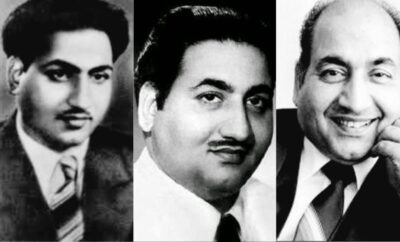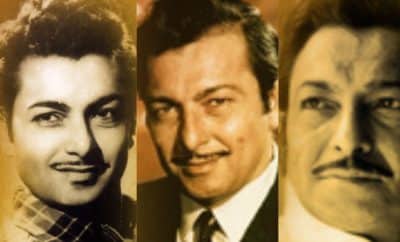Collections
Roshan and Mukesh – A Mellifluous Combo
Say “Roshan”, and a golden-era-music-lover’s mind would instantly be roshan (illuminated) with the aura of all the melodious compositions that he created for the films! Roshan Lal Nagrath’s (popularly known by his mononym Roshan) music was marked by an amazing blend of classical and folk music, with a pinch or two of western music, sprinkled to add to the taste. Starting with Kidar Sharma’s Neki Aur Badi (1949), he composed music for more than fifty films in his career spanning across three decades. Indian classical music was at the helm of his style marked by pleasant and soft melodic phrases comprising closely intertwined notes fluttering like a group of colourful butterflies (remember the oscillating melodic phrases in the line “Hum intazar karenge tera qayamat tak”, for instance?). Although identifiable, his style does not seem monotonous. Generous use of the Indian instruments like flute, sitar and sarod is seen in his compositions, though he also used the western instruments like saxophone and violins many a time. He was also the undisputed monarch of qawwalis in the Hindi films.
One among the composers, who lacked the business knack but remained true to the art with importance to quality rather than quantity, Roshan might not have been successful in terms of remuneration, number Filmfare awards and ranking and frequency of appearance in Binaca Geet Mala. He was nonetheless undoubtedly far ahead of his “successful” compeers, when it came to connoisseur appeal and purity of art.
It is said that Lata Mangeshkar was planning to produce a film named “Bhairavi” in the 1950s. The film was based on classical music, and of all the composers who had proven their mettle by then, she had finalised Roshan for composing music. Though the project was eventually shelved, the incident speaks volume about Roshan’s acumen. The song “Kaahe tarsaaye jiyara” was originally recorded for this film, but was later used in Chitralekha (1964) in the voices of Asha Bhosle and Usha Mangeshkar.
When it came to the female singers, Lata Mangeshkar was Roshan’s first preference evidently. Among the male singers, though Mohammed Rafi has sung a good deal of songs under his baton, he has conspicuously used the voices other singers like Talat Mahmood and Mukesh. Rather, he was among the few composers besides Shankar – Jaikishan, who used Mukesh manifestly in their music.
Mukesh was one of the singers of the golden era who ruled the landscape of film music by carving out a niche for themselves with their unique strengths, despite a limited range. His strength was that he was well aware of his limitations, and kept on pleasing music lovers, remaining well within his limitations. He remained the inimitable and unparalleled voice of melancholy for over three decades. Due to the inherent deep timbre and the nasal twang, he could paint several shades of pathos effectively. This very texture of his voice made it suitable also for romantic numbers. While a few composers perceived these unique traits of Mukesh’s voice as limitations, a few others, including Roshan, capitalised on these very “limitations” and created numerous memorable masterpieces in alliance with him.
Mukesh’s association with Roshan started with one of Roashan’s initial movies (the second movie to be precise), Bawre Nain (1950). Though his preferred singers changed over time, Roshan remained fairly steady with Mukesh and gave him quite a few memorable songs even later. Let us have a quick ride through some of the Mukesh solos sung for Roshan.
1. Teri Duniya Mein Dil Lagta Nahin (Bawre Nain – 1950)
A soulful solo by Mukesh, written by Kidar Sharma and filmed on Raj Kapoor
The film also has the famous romantic duet by Mukesh and Geet Dutt – “Khayaalon mein kisi ke is tarah aaya nahin karte”.
2. Dil Tujhe Diya Tha Rakhne Ko (Malhar – 1951)
Malhar was produced by Mukesh himself. This is a sad song written by Kaif Irani.
The discussion on the music of this film would be incomplete without mentioning the two frolicky and romantic Mukesh – Lata duets, namely “Bade armaanon se rakha hai balam” and “Ek baar agar tu kah de” and their melancholic duet – “Kahaan ho tum? Zara aawaz do”.
3. Apni Nazar Se Unki Nazar Tak (Hum Log – 1952)
A romantic solo with toe-tapping music, filmed on Sajjan and young Nutan. Lyrics are written by Uddhav Kumar.
According to the film historian Bunny Reuben, the film was Balraj Sahni’s first break in Hindi cinema.
4. Sataayega Kise Tu Aasamaan (Sheesham – 1952)
A lamenting song, written by Indeevar
The film has another soulful Mukesh solo – “ Ek jhoothi si tasalli wo mujhe de ke chale” and a romantic Mukesh – Lata duet – “Sapnon mein aana, chhed chhed jaana”.
5. Tere Pyaar Ko Is Tarah Se Bhulaana (Maine Jeena Seekh Liya – 1959)
A sad song with light classical touches, with sitar–dominated orchestration, written by Rahil Gorakhpuri
In the 1950s, Mukesh appeared in Roshan’s music also in many other movies, for example, “Ho dil na lagaana” (Mashuqa – 1953), “Hamen aye dil kahin le chal” (Chandni Chowk – 1954) and “Aadhe udhar hain aur aadhe idhar” (Ghar Ghar Mein Diwali – 1955).
The 1961 film Warrant with Roshan’s soundtrack has a foot-tapping romantic Mukesh – Lata duet “Nainon mein kyun aan base do nain tumhaare” written by Prem Dhawan. The song reminds us of the Mukesh – Lata duets from Malhar.
6. Bahut Diya Denewaale Ne Tujhko (Soorat Aur Seerat – 1962)
A philosophical song written by Shailendra
7. Tum Agar Mujhko Na Chaho (Dil Hi To Hai – 1963)
Raj Kapoor was the protagonist in the film, alongside Nutan. As Mukesh was established as Raj Kapoor’s ghost voice by this time, it was obvious that he ruled the soundtrack of the film. A noteworthy Mukesh solo from the soundtrack is “Tum agar mujhko na chaaho to koi baat nahin”, wherein Raj Kapoor deals with his heartbreak with a practical approach (only Sahir Ludhianvi can prescribe such a way to deal with heartbreak!). The song makes us sympathise for Raj Kapoor, yet simultaneously amuses us.
Other notable Mukesh songs from the film are, the solo “Dil jo bhi khega maanenge”, and the duets “Tumhaari mast nazar agar idhar nahin hoti” and “Chura le na tumko ye mausam suhaana”, sung with Lata Mangeshkar and Suman Kalyanpur respectively.
8. Dekhti Hi Raho Aaj Darpan Na Tum (Nai Umar Ki Nai Fasal – 1966)
A romantic song written by Neeraj, through which Rajeev is praising and wooing Tanuja through Mukesh’s sonorous voice
9. Bahaaron Ne Mera Chaman Loot Kar (Devar – 1966)
A tristful song written by Anand Bakshi, filmed on Dharmendra, Sharmila Tagore and Deven Verma
The film has another popular Mukesh solo – “Aaya hai mujhe phir yaad wo zaalim”.
10. Oho Re Taal Mile Nadi Ke Jal Mein (Anokhi Raat – 1968)
This is perhaps the best joint song by Roshan and Mukesh. The song is penned by Indeevar, and filmed on Sanjeev Kumar, alongwith Zaheeda Hussain and Mukri.
The film has one more Mukesh solo – “Dulhan se tumhara milan hoga”.
Roshan passed away suddenly when he was scoring the music for this film. It is said that his wife Ira Roshan completed the work of the soundtrack. Roshan’s collaboration with Mukesh that started with the former’s second film thus continued till his last film!




Pratik
July 22, 2024 at 12:12 pm
Another beautiful writeup. Informative and enlightening. Always a pleasure to read and discover songs some of them for the first time. Loved reading it.